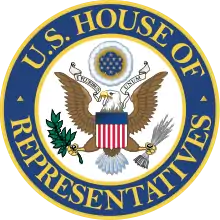John Hailey
John Hailey (August 29, 1835 – April 10, 1921) was a Congressional Delegate from Idaho Territory.
John Hailey | |
|---|---|
 | |
| Delegate to the U.S. House of Representatives from Idaho Territory | |
| In office March 4, 1885 – March 3, 1887 | |
| Preceded by | Theodore F. Singiser |
| Succeeded by | Fred Dubois |
| Delegate to the U.S. House of Representatives from Idaho Territory | |
| In office March 4, 1873 – March 3, 1875 | |
| Preceded by | Samuel A. Merritt |
| Succeeded by | Thomas W. Bennett |
| Personal details | |
| Born | August 29, 1835 Smith County, Tennessee[1] |
| Died | April 10, 1921 (aged 85) Boise, Idaho |
| Political party | Democratic |
| Residence | Boise |
| Profession | Rancher, mining |
He was born in Smith County, Tennessee, and attended the public schools. Of Scottish ancestry, his grandfather, Philip Hailey, and his father, John Hailey, were both natives of Virginia. His father married Miss Nancy Baird, a native of Tennessee, the daughter of Captain Josiah Baird, who had been a captain in the War of 1812.[2]
He moved in 1848 to Missouri with his parents, who settled in Dade County. Hailey crossed the plains emigrating to Oregon in 1853. He enlisted as a private on the outbreak of the Rogue River Indian War in 1855 and was subsequently promoted to lieutenant. John married Louisa M. Griffin on August 7, 1856 in Jackson County, Oregon, and they would have six children including Thomas G. Hailey who would serve in the Oregon Supreme Court.[3] He moved to Washington Territory in 1862 and engaged in agricultural pursuits, stock raising, and mining.
Hailey was elected mayor of Boise, Idaho Territory, in 1871 but never took office.[4]
Hailey was elected as a Delegate to the Forty-third Congress (March 4, 1873-March 3, 1875). He declined to be a candidate for renomination in 1874. He served as member of the Territorial council of Idaho in 1880 and served as its president.
In 1884, Hailey was elected to the Forty-ninth Congress (March 4, 1885-March 3, 1887), but was an unsuccessful candidate for reelection in 1886 to the Fiftieth Congress.
He was appointed warden of the Idaho State Penitentiary in 1899. In 1907, upon the founding of the Historical Society of the State of Idaho – now the Idaho State Historical Society – Hailey was made its first Secretary and Librarian.[5] While Secretary and Librarian in 1910, at the request of the Legislature, Mr. Hailey wrote a history of the state.[6]
He died in Boise, Idaho, April 10, 1921 and was interred in the Masonic Burial Ground. The city of Hailey is named in his honor.[7]
In 1958, he was inducted into the Hall of Great Westerners of the National Cowboy & Western Heritage Museum.[8]
Sources
- Rees, John E. (1918). Idaho Chronology, Nomenclature, Bibliography. W.B. Conkey Company. p. 76.
- An Illustrated History of the State of Idaho, The Lewis Publishing Company, Chicago (1899).
- "Descendants of John H Hailey". Archived from the original on 2007-10-10. Retrieved 2007-06-25.
- Idaho State Historical Society Reference Series, Corrected List of Mayors, 1867-1996
- John H. Hawley, Eighth Biennial Report of the Board of Trustees of the State Historical Society of Idaho, Idaho State Historical Society, Boise Idaho (1922).
- John Hailey, History of Idaho, Syms-York Company, Boise, Idaho (1910).
- Gannett, Henry (1905). The Origin of Certain Place Names in the United States. Govt. Print. Off. pp. 147.
- "Hall of Great Westerners". National Cowboy & Western Heritage Museum. Retrieved November 22, 2019.
- United States Congress. "John Hailey (id: H000023)". Biographical Directory of the United States Congress.
| U.S. House of Representatives | ||
|---|---|---|
| Preceded by Samuel A. Merritt |
Delegate to the U.S. House of Representatives from Idaho 1873-1875 |
Succeeded by Thomas W. Bennett |
| Preceded by Theodore F. Singiser |
Delegate to the U.S. House of Representatives from Idaho 1885-1887 |
Succeeded by Fred Dubois |
![]() This article incorporates public domain material from the Biographical Directory of the United States Congress website http://bioguide.congress.gov.
This article incorporates public domain material from the Biographical Directory of the United States Congress website http://bioguide.congress.gov.
